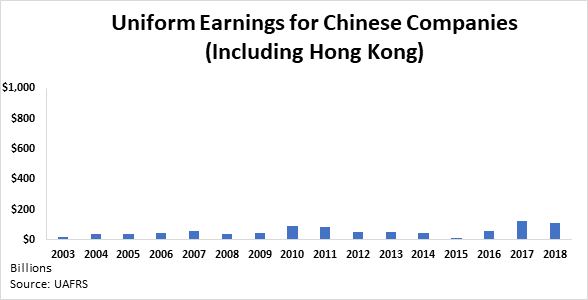China may not be gaining on corporate America as fast as people think

The news cycle is being dominated by diplomatic moves by China abroad, as the U.S. wonders if China will challenge the global hegemony of the U.S.
The ancient Greek historian Thucydides laid out what is now called The Thucydides Trap, where a rising power is inherently threatening to an established one. Now, foreign policy experts believe the U.S. is in this relationship with China.
Today, we will break down whether China is a player on an equal footing economically, or is still behind the U.S.
Investor Essentials Daily:
The Monday Macro Report
Powered by Valens Research
The U.S. has enjoyed the envious position of being the world’s hegemon…
The world stage seemed relatively tranquil for the first time in nearly a century after the collapse of the former Soviet Union in the 1990s.
The “Iron Curtain” fell, the Internet took off, and the peoples of Central and Eastern Europe became more integrated into the global economy.
It appeared that the U.S., with its democratic, market-based system, won the ideological struggle against communism as the world’s unquestionable superpower.
Under the surface though, a sleeping giant was rising across the Pacific Ocean.
The rise of the People’s Republic of China over the past two decades is remarkable. The country of more than 1.4 billion became an economic powerhouse quickly after opening its economy up in the 1980s (with far-reaching global ambitions).
In recent years, China has created messaging that challenged the U.S.-led international order.
Chinese diplomats make statements about how the U.S. lacks its prior hegemonic position when negotiating with China. The country publicly expresses itself as an equal–or greater–power than the U.S. This challenge between a rising power and an established one is Thucydides’ self-titled trap, and according to him, draws both countries into conflict.
As these two large economies ratchet up soft attempts to exert global influence, many academics and journalists highlight a changing of hands. They illustrate the impressive rise in the number of countries that trade more with China compared with the U.S over the past 20 years.
As Bloomberg News notes in its recent coverage of the Chinese Communist Party’s 100th anniversary, Chinese President Xi Jinping has forcefully warned of the consequences for those who think they can intimidate or deter China.
Chinese strength is evident–many now point to corporate China’s growth relative to the U.S., with revenues of $8.3 trillion not too far behind the U.S. corporate sector’s $9.8 trillion.
Names like Huawei, Alibaba (BABA), or Tencent (TCEHY) appear to be becoming more dominant in today’s global markets.
With all of the stories around China’s rise, one wouldn’t be faulted for assuming it’s a foregone conclusion that corporate China will surpass the U.S.
One thing you’ve probably learned about Valens, we don’t just take rhetoric at face value. We look at the data to make sure it’s real, and Uniform Accounting data paints a very different picture.
The world’s greatest money managers know that as-reported financial metrics are essentially useless when looking at companies. Time and time again, they have been shown to mislead investors into believing numbers that are a far cry from a true representation of economic reality.
These insights are so urgent for the U.S. that I was called to the Pentagon earlier this year to present our findings on a true comparison of corporate China vis-à-vis corporate America.
Our data shows that Chinese companies may be growing. But from looking at the Uniform Earnings of more than 2,400 Chinese companies (including Hong Kong), the aggregate earning power–at barely above $100 billion as recently as 2018–is quite small compared with the $8.3 trillion in revenue.
This is because while large, returns of a great many Chinese corporations fall below the cost of capital, meaning most of that revenue is eaten up by costs, and very little turns into actual cash earnings.
On the other hand, U.S. corporations have impressive and expanding economic profitability. Based on Uniform Earnings data of nearly 3,000 U.S. companies, 2018 was almost eight times higher in profitability than corporate China–thanks to their innovation, the strength of intellectual property, and economic moats of U.S. firms.
It might play out in the media as a battle between two equals, at least where corporate profitability and innovation are concerned. But the real data shows quite a different picture with U.S. companies ahead.
Best regards,
Joel Litman
Chief Investment Strategist
at Valens Research






